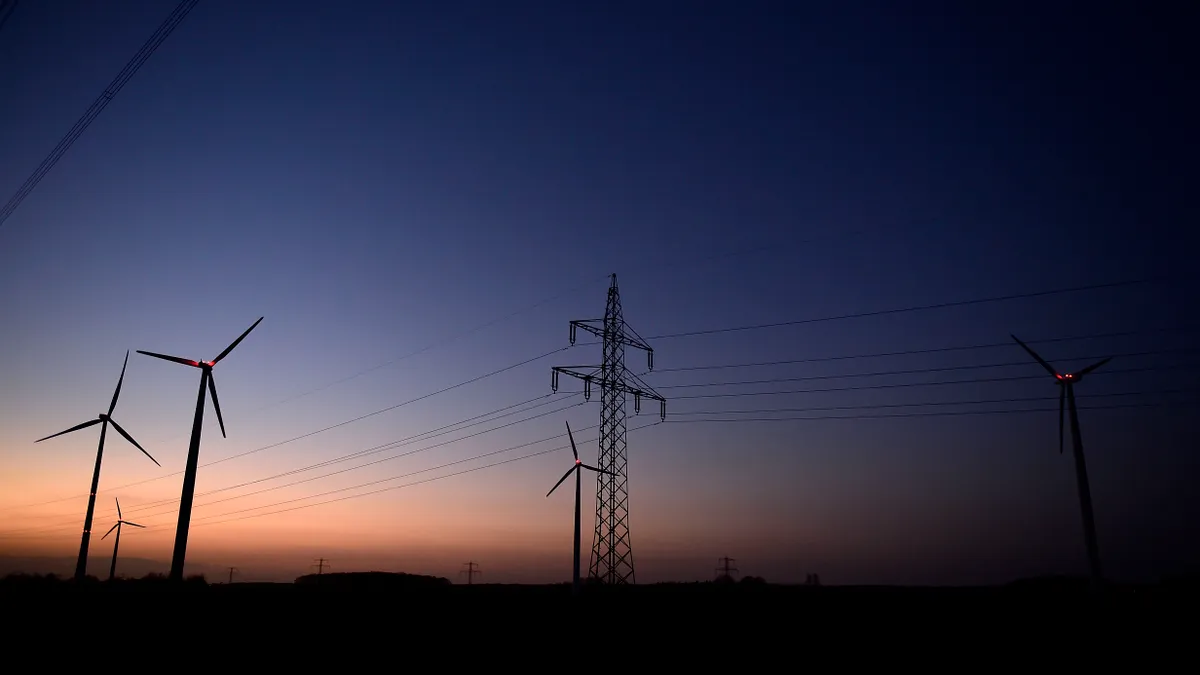Dive Brief:
-
Giving states and the public a bigger role in planning and reviewing transmission projects will make it easier to build the infrastructure needed to meet clean energy and grid reliability goals, according to Federal Energy Regulatory Commission Chairman Richard Glick.
-
A task force between FERC and state utility regulators that meets next month for the first time could produce a "roadmap" for improving the lengthy transmission development process, Glick said Wednesday in a webinar hosted by the Niskanen Center and the Clean Air Task Force.
-
"We definitely need significant amounts of additional transmission, and there's a lot of things that need to be done to get there, some of it regulatory, some of it public acceptance and some of it financing in the private sector," Glick said. "Time is of the essence," he said later in the webinar.
Dive Insight:
Meeting carbon reduction goals will require a "staggering" buildout of energy infrastructure, including electric transmission, according to a report released in August by the Niskanen Center and the Clean Air Task Force.
FERC, which sets requirements for transmission planning, cost allocation and grid interconnections, has a key role in facilitating transmission development, according to Glick.
In a step toward possible changes to those rules, the agency is sorting through comments it received in response to an advanced notice of proposed rulemaking on transmission reform issued in July.
FERC’s goal in the rulemaking process is to facilitate a "better environment" for transmission development, according to Glick.
Glick said he hopes FERC can develop "a reasonable approach that...people can rely on," adding that under the current region-by-region framework, each area handles transmission planning "significantly differently."
At about the same time Glick was saying states need a larger role in the transmission development process, FERC issued an agenda for the initial meeting next month of a first-of-its-kind transmission task force between the agency and the National Association of Regulatory Utility Commissioners (NARUC).
Glick said he hopes the FERC-NARUC task force on Nov. 10 will lead to increased cooperation between federal and state regulators on transmission planning, cost allocation and approval.
"There's a significant need for [states] to work together and work with FERC on some of these issues," Glick said. "And the same with us. I think we realize we can't do it alone either. I'm hopeful that this joint task force will lead to a better approach overall, in terms of transmission development that I think can be used as a roadmap for folks around the country."
States should be involved early in the planning process, according to Glick.
"If the states have a roll up front, in terms of the planning of those [regional] lines, also in helping to adjudicate the cost allocation through the FERC process … I think that actually, again, brings them into the decision making, and probably makes them more likely to facilitate the siting of those lines," Glick said.
At the same time, the planning and approval process should include more public involvement to get increased buy-in on the need for power lines and on how they are paid for, Glick said, noting that buy-in is especially needed from people directly affected by the infrastructure.
"One of the goals is to try to get affected communities, whether it be environmental justice communities, but others as well, to participate in our proceedings," Glick said. Increased public participation in FERC and regional transmission operator transmission planning and approval proceedings will lead to increased buy-in ahead of major decisions, he said.
The report by the Niskanen Center and the Clean Air Task Force suggested creating a national transmission organization as an option for building out the transmission system.
Glick, however, doubted it would be an effective approach, noting it could take a long time to set up the organization.
"Time is of the essence here," Glick said. "We know that there's an enormous demand for building out emissions-free generation. We know it's going to require a lot of transmission, but it has to be done relatively quickly."
It may make more sense to stick with the current paradigm of largely relying on the private sector for transmission development, he said.
On other issues, Glick urged Texans to consider adding transmission links with neighboring areas to help avoid rolling blackouts the Electric Reliability Council of Texas ordered in mid-February.
"The lack of interconnection with the rest of the grid proved deadly," Glick said. "I'm hoping that we can work something out on that."
Also, Glick said he doubted FERC had the authority to impose carbon pricing in the wholesale power markets the agency oversees.
"I'm not sure that would survive a legal challenge and that would probably create more headaches than would be worth it," Glick said.














